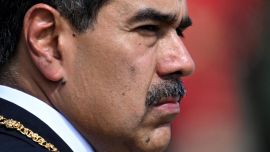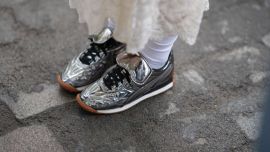On many funerary plaques in the Colombian town of Puerto Berrio, there are no names. Simply the letters N.N, often hand-painted, after the Latin "Nomen nescio" for "anonymous."
During the worst years of Colombia's near six-decade conflict, the 1,540-kilometre (957-mile) Magdalena River that flows past the town in the northern Antioquia department brimmed with hundreds of unidentified bodies.
They washed up swollen, often mutilated, sometimes just body parts.
The dead were extracted from the river, "adopted" by the people of Puerto Berrio and interred at La Dolorosa cemetery, where townsfolk still come to pray and tend to the tombs every day.
"I tell myself that if we take care of a missing person here, someone else somewhere might be taking care of my son's grave," said 60-year-old Blanca Bustamante, whose two children disappeared without trace.
Her son Jhon Jairo Sosa Bustamante, a 20-year-old soldier, disappeared 14 years ago while on leave. Then her daughter Lizeth, aged nine, vanished too.
Nearly 60 years of civil conflict left an estimated 120,000 Colombians listed as missing – four times the toll of the 20th century dictatorships of Chile, Argentina and Brazil combined.
"If they died as N.N, there must be other people who love and care for them. That’s what I hope," Bustamante told AFP among the plastic flowers and hand-painted tomb inscriptions.
'Maybe he is here'
The historic peace accords signed in 2016, resulting in the disarmament of the FARC Marxist guerrilla group, finally allowed Colombian families to start the long and difficult search for their missing loved ones.
The deal gave birth to a special search unit – called the UBPD in Spanish – for missing persons, the majority of them civilians who got caught up in the ruthless war waged by paramilitary groups, guerrillas, drug-traffickers and the security forces.
In five years, the unit has identified 127 bodies through a laborious process of gathering information and DNA – a delicate mission in areas where holdout armed groups still fight today.
In Puerto Berrio alone, 116 unidentified bodies have been found. But there could be as many as 700, according to the UBPD search unit.
Nelcy Díaz recently travelled to Puerto Berrio in search for her husband José Jesús Cubillos, who was 42 when he was kidnapped along with five others from a neighbouring town in 2002.
Someone had told her that a guerrilla sporting six watches on his arm had boasted about killing the six men.
The teacher, 57, assumes her husband's body was thrown into the Magdalena River – Colombia's longest.
"Maybe he is here," she told AFP, showing a photo of her husband on her mobile phone.
José Lupo Escobar, a 69-year-old fisherman, said he had a "love-hate" relationship with the river.
"For us, it is a source of life," but also reminiscent of a "very dark" period.
"We found floating corpses... we often tore off a leg, a hand, sometimes a head" while trying to recover them, he recounted.
'Even a small bone'
Ex-combatant Jairo Mira confessed to having used the river as a "graveyard."
"Daily deaths here were 15 or 20... Puerto Berrio had become a war zone," recalled the 56-year-old who joined a paramilitary group as a teenager.
He served 17 years in prison for a massacre of 30 people.
As the corpses began to accumulate in the cemetery of La Dolorosa, "a very special faith in the community" moved them to embrace the souls of the unknown dead, said Ramón Morales, who was an undertaker in the early 2000s, a particularly grim period of the conflict.
"An N.N. would arrive and there would be people at the door saying: 'Keep it for me'" to take care of, he recalled.
For UBPD search unit head Luz Marina Monzón the people of Puerto Berrio were performing an "act of humanity" that helped "give sense to the horror."
Bustamante said she would continue honoring the unidentified dead and hoping for closure about the fate of her own children.
"Even if it is a small bone, a little finger, it would mean so much to us."
related news
by Lina Vanegas, AFP


























Comments